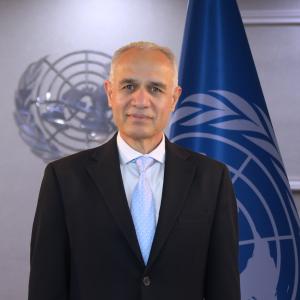OpEd By UN Resident Coordinator in Iraq Ghulam Isaczai: “Water is the Soul of the Earth”: Iraq’s Chance to Lead on Regional Water Security
Deputy Special Representative, Resident Coordinator, Humanitarian Coordinator for Iraq: Ghulam Isaczai
20 April 2025
From microscopic organisms in a single drop of water to ecosystems spanning entire river basins, the role of water in sustaining life is undeniable. In Arabic the proverb, " الماء روح الأرض" — "Water is the soul of the earth" captures this truth. The Tigris-Euphrates rivers, once the foundation of ancient civilizations, are now facing high water stress, threatening Iraq’s social, economic, and environmental future. Without urgent action, the Iraqi Ministry of Water Resources warns that the river could be dry by 2040.
Recognizing these risks, the Government of Iraq took a landmark step in 2023 by acceding to the UN Water Convention—the first Arab country to do so. Yet, accession is just the beginning. As Iraq navigates a complex institutional, environmental, and regional landscape, the real test lies in translating commitment into coordinated implementation.
Since the accession process was initiated in 2014, Iraq has taken commendable steps to advance the Convention’s objectives at national, regional, and international levels. The establishment of a national Inter-Ministerial Committee, chaired by the Deputy Minister of Water Resources, is playing a key role in enhancing cross-sectoral coordination and guiding implementation efforts. Through this process, Iraq has initiated the National Water Dialogue, uniting government, civil society, academia, and international partners to promote policy coherence and water sector reform. This has led to a twinning arrangement with Kazakhstan to share decades of expertise in transboundary water cooperation.
For our part, the United Nations, including FAO, UNDP, WFP, and UNECE, has supported national efforts by strengthening institutional capacity, delivering targeted training and technical assistance, and introducing efficient irrigation technologies. We have improved water productivity, rehabilitated infrastructure to reduce losses and salinity, and contributed to enhanced food security and more resilient rural livelihoods. Recognizing the challenges ahead, we remain committed to working closely with Iraqi authorities to address water scarcity nationwide.
While the foundation is strong, Iraq still faces multi-layered challenges that must be addressed to ensure the full implementation of the Convention and sustainable water governance. Institutional coordination is weakened by overlapping responsibilities and limited integration among federal, regional, and local authorities, hindering unified decision-making, while Iraq also faces gaps in technical and legal expertise to engage effectively with upstream neighbors. Existing domestic water laws need to be updated to align with international frameworks and resolve internal disputes, and environmental challenges such as rising salinity, pollution, and inefficient irrigation further degrade water quality and supply, particularly in southern regions. Iraq remains heavily dependent on water flows from the Euphrates-Tigris basin through bilateral arrangements with Türkiye, Iran, and Syria. However, the absence of comprehensive, binding agreements - relying instead on loosely enforced protocols and MoUs - underscores the urgent need for structural reforms, strengthened regional dialogue, and sustained technical and financial support.
A Call to Action: Advancing Iraq’s Water Security
Iraq’s water sector must urgently adapt to rising temperatures, drought, and scarcity through swift, coordinated action. Its commitment to the UN Water Convention and international cooperation underscores its dedication to water security. To support this transformation, Iraq and partners should focus on three priorities:
1. Strengthen Institutional Capacity: Enhance inter-ministerial coordination through the National Water Dialogue by establishing a formal coordination mechanism with clear roles, regular meetings, and shared accountability across ministries. Invest in modern data collection and water monitoring systems to improve decision-making and early warning capacities. Leverage the tools and frameworks of the UN Water Convention to develop evidence-based policies, harmonize standards, and access technical expertise and capacity-building support. These steps will help institutionalize integrated water resource management and strengthen Iraq’s ability to negotiate and implement transboundary water agreements.
2. Promote International Water Law: Advance Iraq’s engagement in regional water diplomacy by initiating structured dialogue with riparian neighbors (Türkiye, Iran, Syria) under a shared understanding of international water law principles, including equitable and reasonable use and the obligation not to cause significant harm. Utilize neutral, trusted platforms - such as the UNECE and its Water Convention - to facilitate confidence-building and technical cooperation. Advocate for the establishment of a regional water coordination body or joint commission. Draw lessons from successful frameworks like the Sava River Basin Agreement and the Nile Basin Initiative, including data-sharing protocols, joint monitoring mechanisms, and legally binding cooperation frameworks.
3. Invest in Sustainable, Climate-Resilient Water Management: Iraq should expand the use of modern irrigation systems such as drip and sprinkler technologies to enhance efficiency and reduce losses. Scaling up rainwater harvesting and the reuse of treated wastewater, particularly for agricultural and industrial purposes, can help diversify water sources. Promoting climate-smart agriculture - through drought-tolerant crops and sustainable land practices - will increase resilience, drawing from regional success stories. Empowering Water Users Associations with training and legal backing can improve local-level governance and water allocation. Finally, investing in early warning systems and hydro-meteorological data will support better risk forecasting, planning, and response to droughts and floods.
As the first country in the Middle East to join the Water Convention, Iraq – backed by a strong national leadershipand continued support from the United Nations and development partners - has a unique opportunity to lead by example and champion regional cooperation on water governance and knowledge sharing.
Speech by



